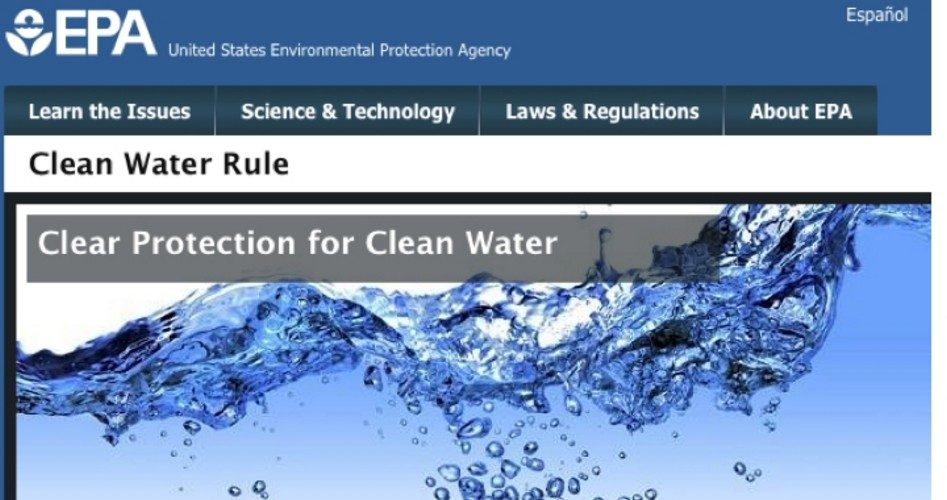
Congressional auditors found on Monday that the Environmental Protection Agency broke the law by launching a social media campaign intended to generate support for its controversial Clean Water Rule, which claims to protect streams and wetlands from development and pollution. The EPA’s social media campaign, which reached nearly two million people, amounts to “covert propaganda,” according to the auditors.
The Environmental Protection Agency’s Clean Water Rule has been the subject of considerable controversy since its inception, with critics calling it a significant federal power grab.
An opinion article in the Washington Times on May 27 observed of the new rule:
President Obama’s administration on Wednesday claimed dominion over all of America’s streams, creeks, rills, ditches, brooks, rivulets, burns, tributaries, criks, wetlands — perhaps even puddles — in a sweeping move to assert unilateral federal authority.
Similarly, House Agriculture Committee Chairman Mike Conaway (R-Texas) warned, “This rule in its current form is a massive overreach of EPA authority.”
The EPA claimed that there was tremendous support for its proposed rule, noting that the agency received over one million comments on it, a vast majority of which were favorable. “We have received over one million comments, and 87.1 percent of those comments we have counted so far — we are only missing 4,000 — are supportive of this rule,” EPA Administrator Gina McCarthy told the Senate Environment and Public Works Committee in March. “Let me repeat: 87.1 percent of those one-plus million are supportive of this rule.”
But a May piece in the New York Times observed that the EPA may have “had a hand in manufacturing” that support through its online campaigns and collusion with environmental groups.
The EPA’s highly publicized campaign efforts to generate support for the rule compelled Senator James Inhofe (R-Okla.) to call for an investigation by the GAO into the EPA’s actions. “There is clear collusion between extreme environmental groups and the Obama administration in both developing and promoting a host of new regulations,” Inhofe observed.
The 26-page report by the Government Accountability Office is the result of that investigation. The report concludes that the EPA’s actions were in violation of lobbying and propaganda restrictions for federal agencies.
The GAO found that the EPA used a social media platform called “Thunderclap” that posts messages on social media accounts of supporters and that the EPA’s Thunderclap campaign was entitled, “I Choose Clean Water.” The Thunderclap campaign reached nearly 1.8 million people, reports the GAO, and is an example of “covert propaganda.”
In addition to the Thunderclap campaign, the GAO report notes that the EPA conducted another campaign in which it provided links to websites run by environmental groups.
The GAO contends those hyperlinks violated restrictions that prohibit federal agencies from engaging in “grassroots lobbying.”
“We also conclude that EPA hyperlinks to the [Natural Resources Defense Council] and Surfrider Foundation webpages provided in the EPA blog post constitute grassroots lobbying, in violation of the grassroots lobbying prohibition,” the GAO wrote.
The government watchdog also found that the EPA violated the law that prohibits the spending of government resources that were not appropriated, The Hill reports.
Despite the GAO’s findings, the EPA has defended its outreach efforts as “appropriately far-reaching” in order to “educate the American public about an important part of EPA’s mission: protecting clean water.”
According to the agency, the social media campaign was merely directed at generating traffic to the webpage regarding the Clean Water Rule. EPA spokeswoman Liz Purchia claims that activity on the social media networks included links to education and outreach materials but at no time asked users to contact members of Congress of state Legislatures. “We maintain that using social media to educate the public about our work is an integral part of our mission,” the agency’s statement said. “We use social media tools just like all organizations to stay connected and inform people across the country about our activities.”
“We have an obligation to inform all stakeholders about environmental issues and encourage participation in the rulemaking process,” the EPA contends.
But for Republicans, the GAO’s report proves that the Obama administration was aggressively pursuing support for its otherwise unpopular rule. “GAO’s finding confirms what I have long suspected, that EPA will go to extreme lengths and even violate the law to promote its activist environmental agenda,” Inhofe said in a statement. “EPA’s illegal attempts to manufacture public support for its waters of the United States rule and sway congressional opinion regarding legislation to address that rule have undermined the integrity of the rulemaking process and demonstrated how baseless this unprecedented expansion of EPA regulatory authority really is.”
The EPA finalized the Clean Water Rule earlier this year, but it continues to face a barrage of challenges. A federal court has placed it on hold as 31 states and numerous businesses are pursuing litigation against it, writes The Hill. Additionally, the Senate has passed a measure to overturn the rule, though the White House has vowed to veto it.


